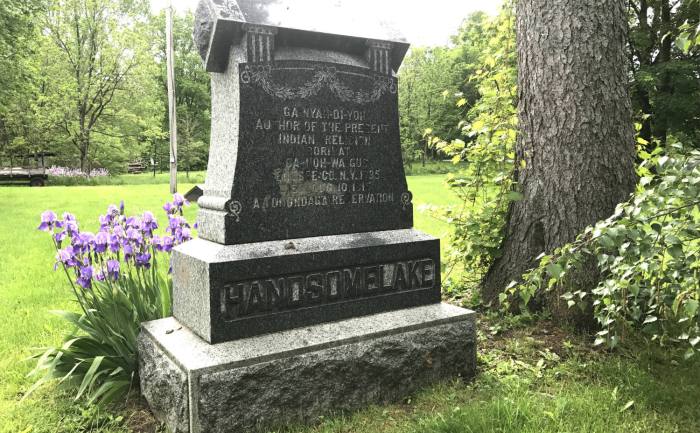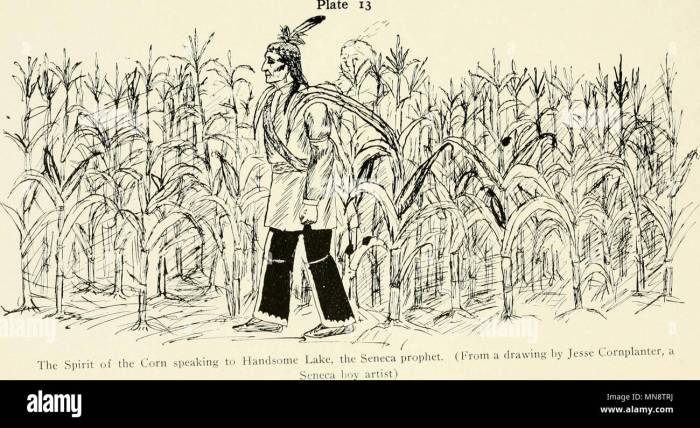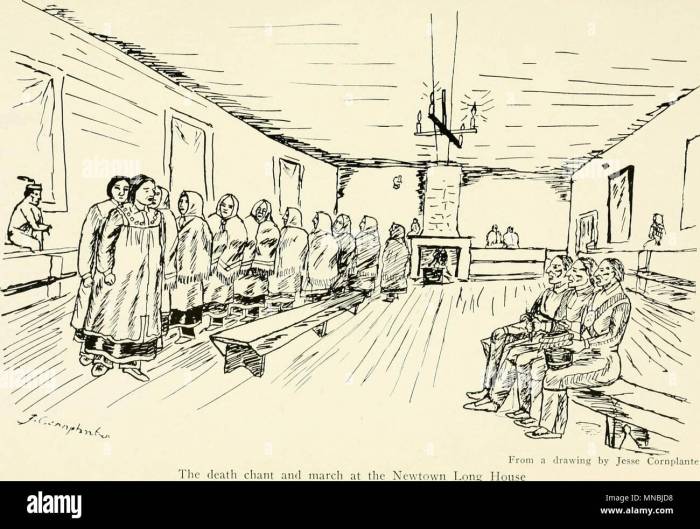Handsome lake and ngundeng were: – Handsome Lake and Ngundeng were two influential spiritual leaders who emerged in the late 18th and early 19th centuries, leaving an enduring legacy on their respective cultures. This narrative explores their historical significance, cultural beliefs, and the impact of their teachings on their followers, drawing parallels and contrasts between their unique journeys.
Their teachings, rooted in deep cultural traditions, emphasized harmony with nature, ethical conduct, and the importance of community. They inspired spiritual revivals that sought to revitalize traditional values and address the challenges faced by their communities during a period of significant social and cultural change.
Historical Background

Handsome Lake, born in 1735, was a Seneca prophet who played a pivotal role in revitalizing the religious and cultural practices of the Iroquois Confederacy. Through visions and revelations, he introduced the Gaiwiio, a moral code emphasizing harmony, balance, and the rejection of alcohol and warfare.
Ngundeng, on the other hand, emerged as a prominent figure in the Maasai community of East Africa during the late 19th century. As a spiritual leader and visionary, he led his people through periods of social and political turmoil, advocating for unity, peace, and the preservation of traditional Maasai customs.
Cultural Beliefs and Practices

Handsome Lake and Ngundeng were influential religious leaders who espoused unique cultural beliefs and practices that profoundly impacted their followers.
Handsome Lake, a Seneca prophet, emerged in the late 18th century. His teachings emphasized the importance of moral living, rejecting alcohol consumption, gambling, witchcraft, and other vices. He also advocated for the preservation of traditional Seneca customs and values, including the Gaiwiio, a code of conduct based on the principles of peace, righteousness, and gratitude.
Teachings and Impact
Handsome Lake’s teachings had a significant impact on the Seneca people. His emphasis on moral living led to a decline in alcoholism and other social problems within the community. The Gaiwiio provided a framework for ethical behavior, fostering unity and harmony among the Seneca.
Ngundeng, on the other hand, was a spiritual leader from the Ndembu people of Zambia. His teachings centered on the concept of mizimu, ancestral spirits who played a vital role in the lives of the living. He believed that mizimu could influence events, both positive and negative, and that it was essential to maintain good relationships with them through rituals and offerings.
Rituals and Practices
Ngundeng’s followers practiced various rituals to honor the mizimu. These included animal sacrifices, libations, and dances. They also believed in the power of divination to communicate with the ancestral spirits and seek guidance.
Similarities and Differences

Handsome Lake and Ngundeng, though separated by vast geographical and cultural divides, shared striking similarities in their teachings. Both emphasized the importance of moral conduct, adherence to traditional values, and the need for spiritual renewal. However, their messages also diverged in significant ways, reflecting the distinct contexts in which they emerged.
Similarities
- Moral Teachings:Both Handsome Lake and Ngundeng taught the importance of living a virtuous life, characterized by honesty, kindness, and respect for others. They condemned vices such as gambling, drunkenness, and adultery, which they believed disrupted social harmony and undermined spiritual well-being.
- Traditional Values:Both leaders emphasized the importance of preserving traditional customs and practices. They recognized that these traditions provided a sense of identity and continuity for their communities. Handsome Lake, for instance, advocated for the revitalization of Seneca rituals and ceremonies, while Ngundeng promoted the preservation of Javanese cultural practices.
- Spiritual Renewal:Handsome Lake and Ngundeng both believed that spiritual renewal was essential for the well-being of their people. Handsome Lake preached the need for a “new covenant” with the Great Spirit, while Ngundeng taught about the importance of seeking spiritual guidance and purification through meditation and self-reflection.
Differences
- Religious Context:Handsome Lake’s teachings were deeply rooted in the traditional beliefs and practices of the Seneca people, while Ngundeng’s message was influenced by a blend of Javanese mysticism and Islamic Sufism. This difference in religious context shaped the specific rituals and practices associated with their teachings.
- Prophecies:Handsome Lake was known for his visions and prophecies, which he claimed to have received from the Great Spirit. These prophecies predicted future events and provided guidance for the Seneca people. Ngundeng, on the other hand, did not claim to have received any direct revelations, but instead relied on his own spiritual insights and experiences.
- Audience:Handsome Lake’s teachings were primarily directed at the Seneca people, while Ngundeng’s message resonated with a wider audience, including both Javanese and non-Javanese followers. This difference in audience influenced the scope and reach of their respective movements.
Legacy and Influence
The teachings of Handsome Lake and Ngundeng have left a lasting legacy on their respective cultures. Their spiritual insights and social reforms continue to inspire followers today.
Handsome Lake’s teachings have shaped the religious beliefs and practices of the Iroquois Confederacy. His emphasis on personal responsibility, sobriety, and community harmony has helped to revitalize Iroquois culture and strengthen their sense of identity.
Influence on Iroquois Culture
- Revival of traditional ceremonies and rituals
- Strengthening of clan and family ties
- Promotion of education and economic development
Ngundeng’s teachings have had a similar impact on the Nguni people of South Africa. His emphasis on unity, respect for elders, and the importance of education has helped to foster a strong sense of community and cultural pride among the Nguni.
Influence on Nguni Culture, Handsome lake and ngundeng were:
- Formation of the Zulu nation and the establishment of a powerful Zulu kingdom
- Development of a system of laws and governance based on Ngundeng’s teachings
- Preservation of Nguni traditions and customs
Comparative Table: Handsome Lake And Ngundeng Were:

This table provides a comparison of the key aspects of Handsome Lake and Ngundeng, including their beliefs, practices, and influence.
Handsome Lake and Ngundeng were two influential religious leaders who emerged in the late 18th and early 19th centuries, respectively. Both leaders preached messages of peace, harmony, and the importance of following traditional values. Their teachings had a significant impact on their respective communities, and their influence continues to be felt today.
Beliefs
- Handsome Lake believed in one creator God, whom he called the Great Spirit. He also believed in the importance of living a moral life and following traditional Iroquois values.
- Ngundeng believed in a pantheon of gods and goddesses, including the supreme god, Rwenzori. He also believed in the importance of following traditional Banyankole values and customs.
Practices
- Handsome Lake’s teachings emphasized the importance of the Longhouse Religion, a traditional Iroquois spiritual practice. He also encouraged his followers to abstain from alcohol and to live in harmony with nature.
- Ngundeng’s teachings emphasized the importance of traditional Banyankole rituals and ceremonies. He also encouraged his followers to respect their elders and to live in peace with their neighbors.
Influence
- Handsome Lake’s teachings had a significant impact on the Iroquois Confederacy. He helped to revitalize traditional Iroquois culture and to promote peace and unity among the different tribes.
- Ngundeng’s teachings had a significant impact on the Banyankole kingdom. He helped to unify the kingdom and to promote peace and stability. His teachings also helped to spread Banyankole culture and traditions throughout the region.
Bullet Point List
The following bulleted list summarizes the key points of the analysis and provides insights and takeaways from the comparison of Handsome Lake and Ngundeng:
- Handsome Lake and Ngundeng were both religious leaders who emerged during a time of great social and political upheaval for their respective peoples.
- Both men preached a message of peace, harmony, and the importance of following traditional values.
- Handsome Lake’s teachings were based on the teachings of the Seneca prophet, Ganioda’yo, while Ngundeng’s teachings were based on the traditional beliefs of the Maasai people.
- Both Handsome Lake and Ngundeng faced opposition from within their own communities, but they eventually gained a large following.
- The teachings of Handsome Lake and Ngundeng have had a lasting impact on their respective cultures, and they continue to be revered as spiritual leaders today.
Quick FAQs
What were the key differences between Handsome Lake’s and Ngundeng’s teachings?
While both leaders promoted ethical conduct and spiritual renewal, Handsome Lake’s teachings focused on individual responsibility and the importance of adhering to traditional Seneca values, while Ngundeng emphasized the collective well-being of the Iroquois Confederacy and the need for unity.
How did the teachings of Handsome Lake and Ngundeng influence their followers?
Their teachings inspired spiritual revivals that revitalized traditional practices, promoted social harmony, and provided a sense of cultural identity during a period of rapid change. They also played a role in shaping political and social movements among their respective communities.
What is the significance of Handsome Lake and Ngundeng in contemporary society?
Their teachings continue to guide and inspire indigenous communities today, offering valuable insights into cultural preservation, spiritual growth, and the importance of ethical living in a rapidly changing world.